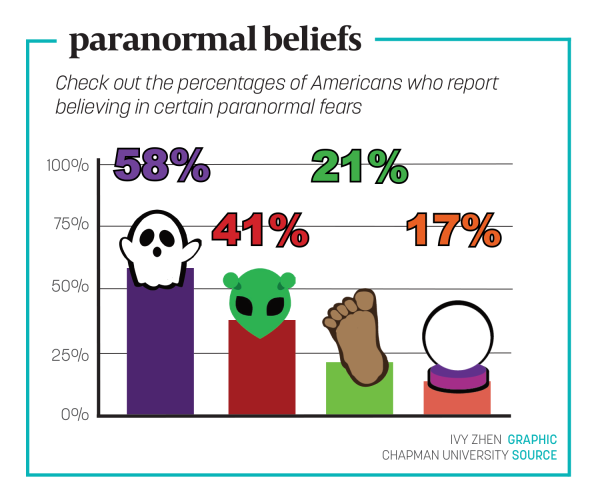For senior Isabella Chan, superstitions have been a part of her life since the day she was born. Being born into Chinese culture, she said, meant that she had to abide by a set of specific rules that outsiders would see as taboo or strange.
“My family avoids the number four like their life depends on it,” Chan said. “Actually if you go to China, a lot of elevators don’t have a fourth story button because it is said that the number four is bad luck. It sounds like ‘to die’ in Mandarin Chinese. A lot of people will not buy houses that have four in the house number or they get their license plates switched out because they think they will die.”
These superstitions aren’t unique to Chinese culture. Other cultures have different superstitions that many students believe in as well. Some common superstitions include those surrounding Friday the 13th, lucky symbols such as horseshoes or doe feet, knocking on wood and even crossing fingers.
Psychiatric nurse Chaoxia “Amy” Lu said many cultures develop superstitions because of the human fear of uncertainty. She said people tend to associate certain behaviors with a desired outcome, like crossing your fingers for a good test score, in order to ease anxiety and to deal with unpredictability.
“Humans like control,” Lu said. “Of course you can’t win a lottery just by knocking on wood or crossing your fingers, but don’t you feel like if you do, you’ll have a better chance of winning? That’s because people like to believe that they have control over situations that they don’t.”
Junior Ashly Cordero Lugo said being Ecuadorian also exposed her to superstitions that have been passed down from her family. She said there have been many situations where she and her family believed in these superstitions and in the supernatural.
“We have a lot of superstitions around spirits and ghosts,” Cordero Lugo said. “One is that you can’t sleep with mirrors facing the bed because it would invite bad spirits since mirrors are believed to be portals that connect them to the world. When I was in Italy, one of my little cousins told my aunt to take out his mirror because he wanted to stop seeing people who were sleeping with him. Another one is that shoes cannot face the stairs because then you invite spirits to walk up those stairs.”
Chan said in Chinese culture, there are a lot of superstitions revolving around poverty and death that her family strongly believes in.
“My mom often tells me not to wear white colored hats because white is what you traditionally wear to a funeral in China,” Chan said. “Also, the number 8 is considered lucky because it sounds like ‘wealthy’ in Chinese. A lot of our superstitions are about death or money because, in Chinese culture, a lot of people value their wealth and status but also health.”

Lu said superstitions can also be a result of reinforcement, such as getting a perfect score when you wear a blue shirt or when you use a specific pencil. She said people subconsciously connect the positive outcome with the scenario and it eventually turns into a superstition.
“A lot of the patients I work with have obsessive-compulsive disorder (OCD) and a lot of the time, they are very very superstitious because, like I said, humans like control and are scared when they cannot predict the outcome,” Lu said. “A lot of people make connections between one thing and another. You wear a black jacket when you take an exam and you end up scoring high, would you wear that jacket again? You would probably say yes because you want the same outcome again. That reminds me of a superstition that my mom believes in. She said that whenever I or one of my siblings had to take an exam, she would wear red because it was a lucky color (as) my brother scored a near-perfect SAT score when she wore a red shirt the same day.”
Chan said there are a lot of superstitions in her culture and her family believes in them strongly.
“Sometimes it can be annoying because I can’t do this and I can’t do that just because my parents think something bad is going to happen,” Chan said, “but I feel like it is really interesting that we have those superstitions and also to learn about what other cultures believe in. I think it makes each culture really different and unique.”































![What happened to theater etiquette? [opinion]](https://hilite.org/wp-content/uploads/2025/04/Entertainment-Perspective-Cover-1200x471.jpg)














































![Review: “The Immortal Soul Salvage Yard:” A criminally underrated poetry collection [MUSE]](https://hilite.org/wp-content/uploads/2025/03/71cju6TvqmL._AC_UF10001000_QL80_.jpg)
![Review: "Dog Man" is Unapologetically Chaotic [MUSE]](https://hilite.org/wp-content/uploads/2025/03/dogman-1200x700.jpg)
![Review: "Ne Zha 2": The WeChat family reunion I didn’t know I needed [MUSE]](https://hilite.org/wp-content/uploads/2025/03/unnamed-4.png)
![Review in Print: Maripaz Villar brings a delightfully unique style to the world of WEBTOON [MUSE]](https://hilite.org/wp-content/uploads/2023/12/maripazcover-1200x960.jpg)
![Review: “The Sword of Kaigen” is a masterpiece [MUSE]](https://hilite.org/wp-content/uploads/2023/11/Screenshot-2023-11-26-201051.png)
![Review: Gateron Oil Kings, great linear switches, okay price [MUSE]](https://hilite.org/wp-content/uploads/2023/11/Screenshot-2023-11-26-200553.png)
![Review: “A Haunting in Venice” is a significant improvement from other Agatha Christie adaptations [MUSE]](https://hilite.org/wp-content/uploads/2023/11/e7ee2938a6d422669771bce6d8088521.jpg)
![Review: A Thanksgiving story from elementary school, still just as interesting [MUSE]](https://hilite.org/wp-content/uploads/2023/11/Screenshot-2023-11-26-195514-987x1200.png)
![Review: "When I Fly Towards You", cute, uplifting youth drama [MUSE]](https://hilite.org/wp-content/uploads/2023/09/When-I-Fly-Towards-You-Chinese-drama.png)
![Postcards from Muse: Hawaii Travel Diary [MUSE]](https://hilite.org/wp-content/uploads/2023/09/My-project-1-1200x1200.jpg)
![Review: "Ladybug & Cat Noir: The Movie," departure from original show [MUSE]](https://hilite.org/wp-content/uploads/2023/09/Ladybug__Cat_Noir_-_The_Movie_poster.jpg)
![Review in Print: "Hidden Love" is the cute, uplifting drama everyone needs [MUSE]](https://hilite.org/wp-content/uploads/2023/09/hiddenlovecover-e1693597208225-1030x1200.png)
![Review in Print: "Heartstopper" is the heartwarming queer romance we all need [MUSE]](https://hilite.org/wp-content/uploads/2023/08/museheartstoppercover-1200x654.png)


